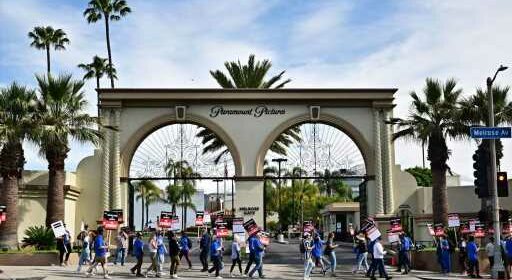AI Debate Is Not Our Biggest Issue — I Would Like Residuals: Writers Strike Takes Spotlight at BANFF

The debate around the application of artificial intelligence in the creative sector has been a hot-button issue in the writers strike, but not all scribes believe it warrants the airtime it’s so far received.
Speaking on a Variety-moderated writers strike panel at the Banff World Media Festival on Monday, “The Other Black Girl” and “Swarm” writer Kara Brown said AI has been “the stickiest thing and people have been talking about it a lot, when it feels to me like this is not our biggest issue — I would like residuals.”
Continued Brown: “There are other things that are more fundamental today in impacting a writer’s ability to do their job. And AI feels like something that people outside the industry can understand, and people are talking about. It sounds scary, but to me at least, I don’t think it’s close to our biggest issue.”
Brown was joined on the panel by Emmy-nominated “This Is Us” writer and co-executive producer Elan Mastai and “Joyride” and “Crazy Rich Asians” writer Adele Lim.
“[AI] is giving bitcoin; it’s giving a bunch of tech people,” said Brown to laughs from the audience. “Or Elon Musk saying you’re all going to be driving self-driving cars, and then these cars murdering people constantly. I think there are a lot of legal fights before this AI thing is happening, because you can’t copyright AI.”
Regardless of its real-world feasibility, however, Mastai raised the importance of having “rules” in place for using AI in entertainment.
“All I want is guardrails in place,” said the Canadian writer. “I think it’s going to save the studios from themselves to get some common-sense regulation in place. And the thing is, it’s going to be very key for when people are spending a lot of money on this stuff, and it’s going nowhere.”
Asked whether the Directors Guild of America’s tentative deal with the AMPTP (which is awaiting ratification) has driven a shift in strategy for the WGA, the writers agreed that it’s unlikely to affect any WGA proposals.
“What the DGA achieved with their contract was a good basis for us to build off of, in terms of basic things like crew hours, etc.” said Lim. “The WGA isn’t going to take that as the pattern for what we need to accept. Same with the SAG contract.”
Earlier this month, the membership of SAG-AFTRA voted overwhelmingly to approve a strike authorization, with 97.91% of voting members supporting the authorization. Turnout was 47.69%. The move to hold a strike authorization vote prior to actual talks with the AMPTP was an unusual one, but a crucial signifier of where the union stood going into negotiations.
Brown predicted that if a deal isn’t reached between the actors’ union and the AMPTP by June 30, the entire industry will come to a standstill.
“On a literal level, you can’t do anything, so that was very encouraging because it also means you have to have a serious conversation with [SAG] when a strike is on the table … I think it would be great if SAG went on strike because it would speed things up,” said Brown.
“But I think [the WGA] has done a really good job of preparing us and making it clear that we’re working for the things that are important to us, and we want people to get what they need but we’re not going to change what we want or give in to something because [the AMPTP has] made a deal with other unions. It would be great, we love the solidarity, but it means literally being able to write for a living. And that doesn’t really have anything to do with the deals the other guilds are making.”
Read More About:
Source: Read Full Article